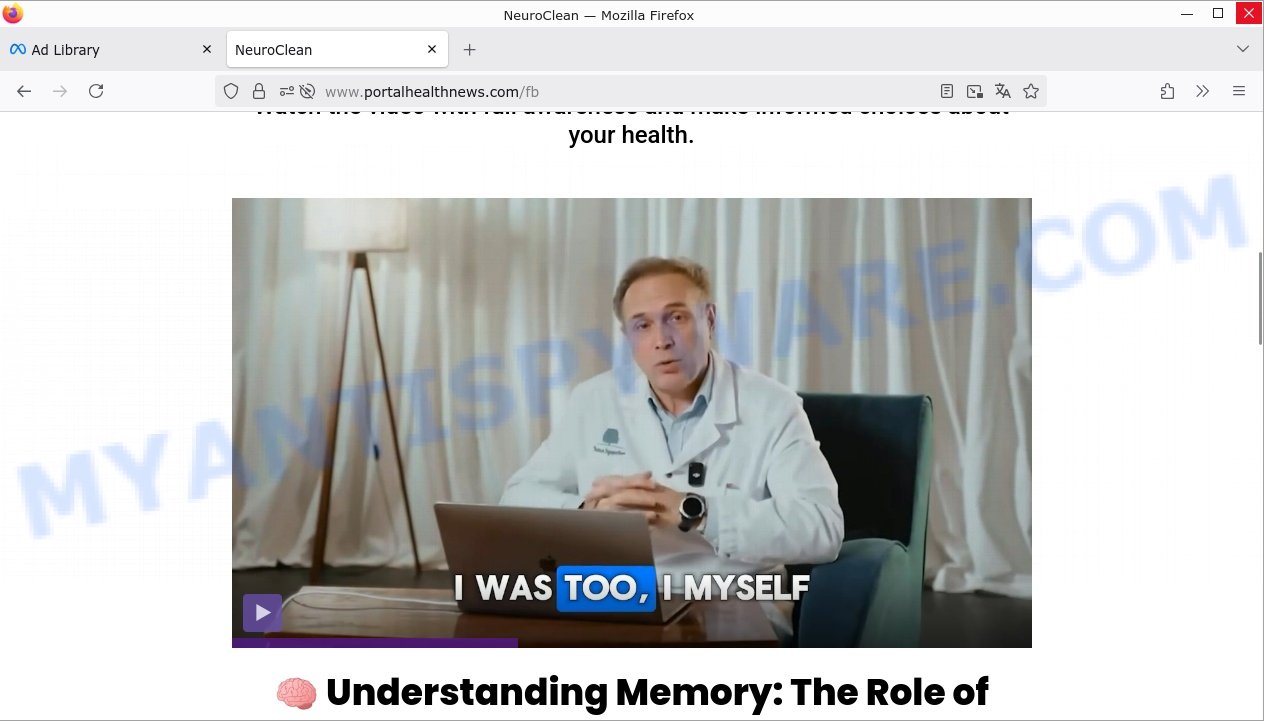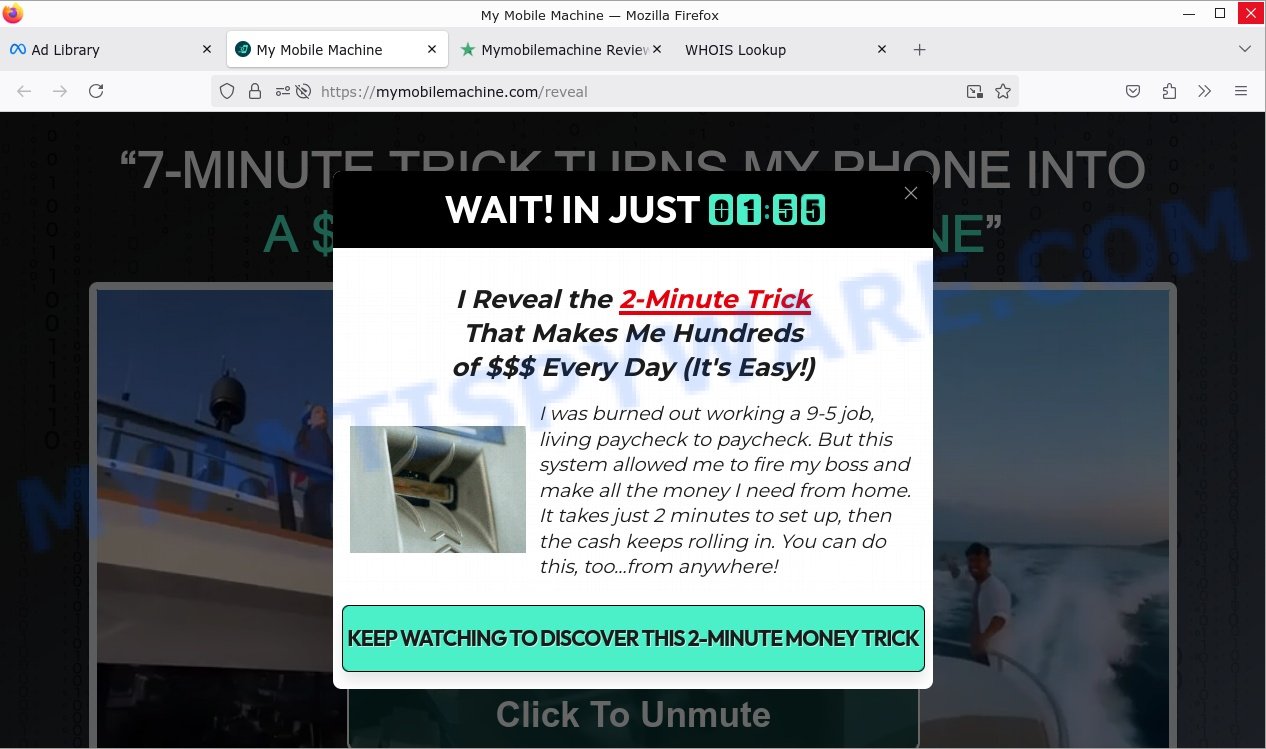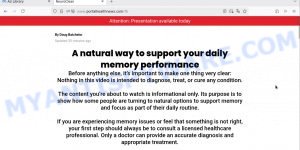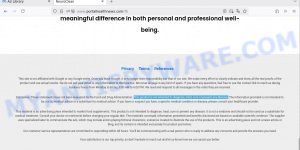Scammers are aggressively pushing NeuroClean—a so-called “cognitive support” supplement that falsely claims it can restore your memory, boost brain function, and reverse cognitive decline in just minutes. Despite the polished marketing, these promises are pure fiction. NeuroClean is heavily advertised on Facebook and Instagram using deceptive videos often featuring AI-generated voices and deepfake visuals, tricking viewers into believing fake endorsements by a nonexistent neuroscientist named Mark Ross and even famed actor Anthony Hopkins.

The website portalhealthnews.com hosts lengthy sales presentations full of misleading statements and empty guarantees that are impossible to verify. Although the site tries to appear professional, it never provides real scientific evidence or legitimate customer testimonials backing its claims. Instead, it uses vague disclaimers and confusing medical jargon to sound credible while hiding the truth.
Many users searching for NeuroClean reviews find no genuine feedback or trustworthy sources. The few “reviews” that appear are suspicious and clearly fabricated to lure buyers. The product is not sold in reputable stores—instead, it’s available only through questionable third-party sellers online, highlighting the suspicious nature behind this supplement. There’s no transparent information about who manufactures it, where it’s made, or its actual ingredients.
If you’re struggling with memory or brain health issues, don’t fall for scams like NeuroClean promising miracles with no basis in medical science. Always consult a licensed healthcare professional before trying any new products, especially those aggressively pushed on social media with fake endorsements and dubious promises. Real cognitive health solutions come from trusted medical advice, not from slick marketing scams designed to exploit your concerns. Stay informed and protect yourself from fraudulent products that offer nothing but empty hope and wasted money.
💡 Heads-up: Similar Scams Are Everywhere. NeuroClean is not unique. It is one of many fake supplements, gadgets, and other schemes we expose in our Fact Checks section. All of them aim to grab your personal data or money. The people behind these scams run slick websites, spread bogus promo codes, and even pose as trusted brands or experts. Below are a few recent scams that follow the same playbook as NeuroClean: PetsBoro Bunny Pal, Nu Nerve, Dr. Emma Clark Pumpkin Seed Recipe, Web3 Crypto Exchange Platform, AlphaCur Nerve Health Support.
Table of Contents
🚨 Is NeuroClean a Scam?
NeuroClean, marketed as a cognitive function supplement, raises serious red flags indicating it is a scam designed to deceive vulnerable consumers seeking memory support and brain health solutions. Despite claims of endorsements by neuroscientists and celebrities, there is no credible evidence to support these assertions.
Key Red Flags:
- 🌐 Deceptive Marketing Through Social Media: Advertisements for NeuroClean aggressively target users on Facebook and Instagram, funneling them into lengthy video presentations hosted on suspicious domains like portalhealthnews.com. These videos employ deepfake visuals and AI-generated audio to fabricate endorsements and false promises, including unreliable money-back guarantees.
- ⭐ Fake Endorsements and Testimonials: Claims that well-known figures and medical professionals endorse NeuroClean are entirely unfounded. No physicians, hospitals, or reputable institutions support the product, and the supposed testimonials are likely manufactured.
- 🔒 Misleading Website Content: The website hosting NeuroClean’s promotional material disclaims any intention to diagnose or cure diseases, yet simultaneously implies the supplement can dramatically improve memory and cognitive function. This contradictory messaging is a common tactic to skirt regulatory scrutiny while making enticing yet unsubstantiated claims.
- ⚠️ Exaggerated Health Claims Without Evidence: NeuroClean’s marketing promises rapid reversal of memory loss and cognitive decline. These bold claims lack peer-reviewed scientific backing and exploit fears around conditions like Alzheimer’s to pressure consumers.
- 📉 Lack of Transparency and Product Information: Details about NeuroClean’s manufacturing, ingredients, and company background are absent or vague, undermining trust and preventing verification of product quality or safety.
- 👤 Use of Actors and Scripted Scenarios: The promotional videos openly state that actors and fictional scenarios are used, highlighting the purely advertising nature of the content rather than genuine medical advice or testimonials.
- 🔗 Suspicious Sales and Distribution Practices: NeuroClean is primarily sold through third-party sellers on marketplaces like Amazon and Walmart’s website, not in physical stores. This distribution method often allows substandard and counterfeit products to circulate unchecked.
In summary, NeuroClean exhibits all the signs of a fraudulent supplement scam. The fabricated endorsements, misleading marketing tactics, lack of credible scientific support, and opaque product information strongly suggest it is not a legitimate cognitive health solution. Consumers should avoid NeuroClean and consult qualified healthcare providers for evidence-based approaches to memory and brain health.
🕵️♂️ How the NeuroClean Cognitive Supplement Scam Operates
The scammers behind NeuroClean start by deploying highly targeted video ads and sponsored posts on social media platforms like Facebook and Instagram. These ads promise miraculous improvements—rapid memory restoration, enhanced focus, and cognitive clarity—often featuring shocking claims backed by fake endorsements, including a neuroscientist named Mark Ross and celebrity endorsements from actors like Anthony Hopkins. They use deepfake visuals, AI-generated audio, flashy graphics, and fabricated testimonials to lure people desperate for a quick cognitive fix.
When users click these ads, they’re redirected to slick yet suspicious websites such as portalhealthnews.com that host lengthy video presentations. These sites mimic credible health portals but display content mainly as video or images, making independent verification difficult. By imitating trustworthy designs and using authoritative-sounding narrators, scammers create a false sense of legitimacy, misleading consumers into believing NeuroClean is supported by genuine medical experts and respected institutions.
A common tactic involves fabricating endorsements and misleading certification claims like “FDA Approved” or “GMP Certified”, despite the fact that dietary supplements like NeuroClean are never FDA approved as drugs or treatments. They add urgent calls to action, such as “Limited Time Offer” or “Only a Few Bottles Left”, to pressure consumers into making snap decisions. Steep discounts and “risk-free” money-back guarantees are prominently featured to build confidence, even though refund policies are generally complicated, non-transparent, or outright ignored.
The testimonials presented on these websites are overwhelmingly positive, often showing thousands of glowing five-star reviews and fake success stories. However, independent review platforms like Trustpilot reveal no credible reviews or report overwhelmingly negative feedback, exposing the high likelihood that these testimonials are fabricated or manipulated.
After purchasing, consumers frequently find themselves targets of aggressive upselling tactics, with offers of additional bottles or memberships disguised as exclusive savings or free shipping. Worse yet, many report unauthorized recurring charges and extremely poor or non-existent customer support, leaving buyers out of pocket and frustrated.
In summary, the NeuroClean scam relies on deceptive social media advertisements, misleading deepfake endorsements, falsified certifications, and fake testimonials to trick consumers into buying a supplement with no verified scientific backing or legitimate clinical support. Ultimately, buyers are left disappointed, financially harmed, and still searching for effective help for their cognitive concerns.
😱 What to Do If Scammed
If you find yourself ensnared by the NeuroClean Scam, immediate action is crucial. Here’s what you should consider doing:
🛑 Stop Further Transactions
The first step is to halt any additional transactions that might be in process. Contact your bank or credit card provider and inform them that you’ve fallen victim to a scam. They can help by blocking the card or reversing any unauthorized transactions.
📞 Report the Fraud
File a report with your local police and provide all the available evidence, such as screenshots, emails, and website URLs. Additionally, report the scam to online portals like the Better Business Bureau (BBB) at www.bbb.org or the Federal Trade Commission (FTC) at reportfraud.ftc.gov. If you’re in another country, reach out to your national consumer protection agency.
💻 Take Screenshots
Before the scam website gets taken down or changes, make sure to capture screenshots of your transactions and communications. These can serve as evidence if you decide to pursue legal action.
⚖️ Consult Legal Advice
Speak to a legal advisor about your situation. While pursuing legal action may be time-consuming and costly, it could be a possible avenue for recovering your lost money.
📢 Share Your Experience
Use social media platforms to share your experience and warn others about the scam. Your story could prevent someone else from falling victim to the same or similar scams.
Conclusion
The NeuroClean cognitive support supplement is a scam, using deceptive marketing tactics, fake endorsements, and misleading claims to convince consumers of its effectiveness. The supposed endorsements by neuroscientist Mark Ross and actor Anthony Hopkins are entirely fabricated, relying on deepfake technology and AI-generated audio to create a false sense of credibility.
NeuroClean’s promotions utilize social media ads directing users to lengthy online presentations filled with exaggerated promises of reversing memory loss and restoring cognitive function in mere minutes. However, no legitimate scientific evidence supports these claims, and the product is not endorsed by any real doctors, hospitals, or universities.
The website portalhealthnews.com mimics trustworthy health information portals, but it clearly states that NeuroClean is not a medicine and is not intended to diagnose, treat, or cure any disease. Despite this disclaimer, the marketing falsely implies dramatic benefits that exploit vulnerable individuals experiencing memory issues.
Bottom Line: Avoid NeuroClean. Lack of transparency regarding the manufacturer, ingredients, or clinical testing, coupled with the use of fake testimonials and manipulated content, indicate this is a fraudulent product. Always consult healthcare professionals and critically evaluate any supplement promising unrealistic cognitive improvements. Stay vigilant and skeptical when confronted with products that use deceptive tactics and unverifiable endorsements.






















